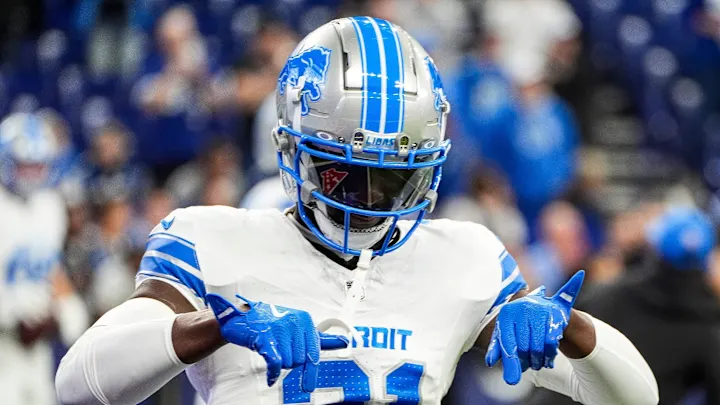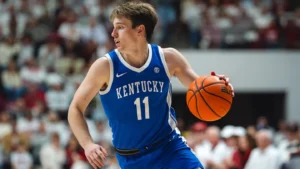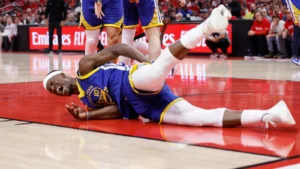
The Detroit Lions offer the Baltimore Ravens’ Kyle Hamilton extension blueprint.
The Detroit Lions are an NFL team that has historically been underperforming in terms of playoff success, but they have recently shown promising potential. Over the past few seasons, they have significantly revamped their roster, focusing on both offense and defense to ensure their competitiveness. In this pursuit of success, one area they could look to for further improvement is their secondary, where a player like Kyle Hamilton, currently playing for the Baltimore Ravens, could serve as a blueprint for success.
Kyle Hamilton, a rising star in the NFL and a key player for the Ravens, offers a blueprint for how a team can invest in a young, versatile safety to shape their defense for years to come. The Detroit Lions could potentially build a similar strategy to retain their defensive assets, such as safeties and other secondary players, using the structure and style of the extension given to Hamilton as a model for future negotiations.
To begin, it’s important to understand what makes Hamilton so valuable. The 2022 draft saw Hamilton, a safety from Notre Dame, fall to the Ravens with the 14th overall pick. At 6’4” and 220 pounds, Hamilton was one of the most physically imposing defensive backs in his class. However, it wasn’t just his physical attributes that stood out. Hamilton has shown remarkable football IQ, versatility, and an innate ability to read opposing offenses. His skill set has allowed him to be deployed in various roles, from covering wide receivers to acting as a traditional safety and even stepping in as a linebacker in some situations.
For the Ravens, Hamilton has quickly become an essential piece of their defense. His ability to impact the game in multiple ways has elevated the secondary and allowed the Ravens to have more flexibility in their defensive schemes. Given the way the game is evolving, having a safety who can excel in pass coverage, run support, and even serve as a blitzer, is incredibly valuable. The Ravens have recognized this, which is why it makes sense for them to offer Hamilton an extension that reflects both his current value and his potential future contributions.
Now, let’s examine how the Detroit Lions might look at this situation and apply a similar strategy for their own defense. The Lions have been in a rebuilding phase for several years, but recent improvements in their draft strategy, coaching staff, and roster construction have started to pay dividends. As the Lions look to continue their upward trajectory, focusing on strengthening the secondary could be crucial.
One of the first steps the Lions could take is identifying key players who have the potential to develop into the next Kyle Hamilton-type safety for their defense. The Lions’ current safety group, led by Tracy Walker, is solid, but there may be room for improvement, especially in terms of long-term potential. The Lions’ front office and coaching staff should focus on targeting players who can contribute immediately and also develop into leaders on the defensive side of the ball over the next several seasons.
If the Lions find a player like Hamilton—someone who can have an immediate impact and also develop into one of the top safeties in the league—they will want to secure that player for the long term. In this sense, the extension blueprint offered to Hamilton would be a useful model. The Ravens are likely to structure their offer to Hamilton based on a variety of factors, including his performance, age, and the potential value he will bring to their defense over the life of the contract.
For the Lions, a similar approach could be adopted. In the case of a rising star like Hamilton, the extension would likely involve a substantial financial commitment, as teams are increasingly prioritizing elite secondary players. However, the Lions should also consider structuring the contract in a way that provides both financial security for the player and cap flexibility for the team. The key here is to balance long-term value with current roster needs, a strategy that the Ravens have employed with success in recent years.
When it comes to the financials, an extension for a player of Hamilton’s caliber would likely include significant guaranteed money, particularly if the player is still in the early stages of his career. For the Lions, the structure of a potential contract would need to reflect the changing landscape of the NFL’s salary cap. Many teams are opting for shorter-term contracts with high annual values, but the Lions could offer a contract that ensures the player is locked in for several years while also providing the flexibility to make other moves.
Another critical aspect of the extension would be the role Hamilton would play in the defense moving forward. For the Ravens, Hamilton is already one of the most versatile players on the defense, capable of lining up in multiple positions. The Lions could look to draft or acquire a similar type of player—someone who can be used in a variety of roles and has the athleticism to be effective in both pass coverage and run support. The importance of a safety with this versatility cannot be overstated in today’s NFL, where offenses are increasingly utilizing multiple sets and formations to create mismatches.
The Lions should also consider how their defensive scheme could evolve in the coming years. As the league becomes more pass-heavy, the need for players who can cover wide receivers and tight ends while still being able to support the run becomes more pronounced. The blueprint for Hamilton’s extension highlights the value of these types of players, and the Lions would do well to find a similar talent who can grow within their defensive scheme.
One potential route the Lions could take is utilizing their draft capital to target safeties or defensive backs who possess similar traits to Hamilton. The Lions could look to replicate the Ravens’ approach by identifying a young, athletic player with high upside, and then build their defense around that player. This strategy, while bold, could pay off in the long run, particularly if the player is able to quickly acclimate to the NFL and provide immediate contributions.
Beyond the financial structure of an extension, the Lions would also need to consider the timing of any potential contract offers. Offering an extension to a player of Hamilton’s caliber early in their career not only ensures that the player remains in the fold for several years but also locks them in before they hit their peak earning potential. The Ravens, by offering Hamilton a contract extension early in his career, would be ensuring they retain his services during the prime of his playing days. The Lions could adopt a similar strategy, offering early extensions to players they believe will be cornerstones of their defense in the future.
A key factor in this approach is the relationship between the player and the organization. The Ravens and Hamilton have established a strong bond, with both parties recognizing the value he brings to the team. If the Lions were to pursue a similar strategy, they would need to ensure they are fostering a positive, collaborative relationship with their key defensive players. This relationship is essential not only for contract negotiations but also for long-term team success.
In conclusion, the Detroit Lions could greatly benefit from using Kyle Hamilton’s contract extension as a blueprint for building a strong secondary. By identifying young, versatile defensive backs who can impact the game in multiple ways, the Lions would be making a critical investment in their future. While financial considerations are important, the Lions must also prioritize building a defense that can evolve with the changing landscape of the NFL. Through smart drafting, strategic extensions, and a focus on developing key players, the Lions could establish a defense that mirrors the success of the Ravens’ defensive unit, with Kyle Hamilton serving as the model for long-term success.





